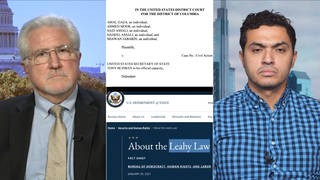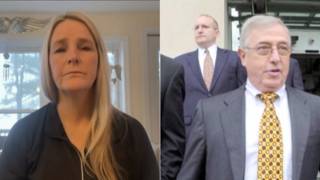
Related
Guests
- Gareth Porterhistorian and investigative journalist specializing in U.S. national security policy.
President Obama’s plan to draw down U.S. troops in Afghanistan still leaves more in the country than when he came into office. In a televised address, Obama said he will also bring home another 23,000 troops by the end of summer in 2012, leaving around 70,000 military forces, plus thousands of contractors. We discuss the longest war in U.S. history with Gareth Porter, an investigative journalist and historian specializing in U.S. national security policy. “There is an effort here to create a narrative that, as he put it, the war is receding, the tide of war is receding, when in fact nothing of the sort is happening,” says Porter. “Clearly, the Taliban are carrying out counterattacks this year and will do so again next year. That’s not going to come to an end.” [includes rush transcript]
Transcript
JUAN GONZALEZ: We begin today’s show on the nearly decade-old war in Afghanistan. It is already the longest war in U.S. history. On Wednesday night, President Obama announced a plan to withdraw 10,000 troops from Afghanistan this year and bring another 23,000 home by the end of the summer in 2012.
PRESIDENT BARACK OBAMA: Thanks to our extraordinary men and women in uniform, our civilian personnel, and our many coalition partners, we are meeting our goals. As a result, starting next month, we will be able to remove 10,000 of our troops from Afghanistan by the end of this year, and we will bring home a total of 33,000 troops by next summer, fully recovering the surge I announced at West Point. After this initial reduction, our troops will continue coming home at a steady pace as Afghan security forces move into the lead. Our mission will change from combat to support. By 2014, this process of transition will be complete, and the Afghan people will be responsible for their own security.
We’re starting this drawdown from a position of strength. Al-Qaeda is under more pressure than at any time since 9/11. Together with the Pakistanis, we have taken out more than half of al-Qaeda’s leadership. And thanks to our intelligence professionals and Special Forces, we killed Osama bin Laden, the only leader that al-Qaeda had ever known. This was a victory for all who have served since 9/11. One soldier summed it up well. “The message,” he said, “is we don’t forget. You will be held accountable, no matter how long it takes.”
JUAN GONZALEZ: President Obama’s plan would leave around 68,000 military personnel, plus thousands of contractors, still in the country—the same size as before the troop surge last year. Along with emphasizing what the U.S. and its allies had achieved since the surge, Obama acknowledged that work remained to be done.
PRESIDENT BARACK OBAMA: In Afghanistan, we’ve inflicted serious losses on the Taliban and taken a number of its strongholds. Along with our surge, our allies also increased their commitments, which helped stabilize more of the country. Afghan security forces have grown by over 100,000 troops, and in some provinces and municipalities we’ve already begun to transition responsibility for security to the Afghan people. In the face of violence and intimidation, Afghans are fighting and dying for their country, establishing local police forces, opening markets and schools, creating new opportunities for women and girls, and trying to turn the page on decades of war.
Of course, huge challenges remain. This is the beginning, but not the end, of our effort to wind down this war. We’ll have to do the hard work of keeping the gains that we’ve made, while we draw down our forces and transition responsibility for security to the Afghan government. And next May, in Chicago, we will host a summit with our NATO allies and partners to shape the next phase of this transition.
JUAN GONZALEZ: President Obama concluded his speech by saying that Americans can take solace in the fact that two long conflicts were being brought to an end.
PRESIDENT BARACK OBAMA: Yet tonight, we take comfort in knowing that the tide of war is receding. Fewer of our sons and daughters are serving in harm’s way. We’ve ended our combat mission in Iraq, with 100,000 American troops already out of that country. And even as there will be dark days ahead in Afghanistan, the light of a secure peace can be seen in the distance. These long wars will come to a responsible end.
AMY GOODMAN: To discuss the President’s remarks, we go to Washington, D.C., to Gareth Porter, historian, investigative journalist, specializing in U.S. national security policy.
Your assessment of President Obama’s announcement last night?
GARETH PORTER: Oh, I think there are two major storylines here about his speech. First, he made it clear that he had leaned very sharply in favor of the interests of the Pentagon and the military, as opposed to the interests or the views of those in his own administration who believe that we needed to save a lot more money from this war by withdrawing troops much faster, particularly the increment called the surge starting in 2010. He basically gave General Petraeus most of what he wanted, despite the fact that you’re going to hear cries of pain from supporters of the military that he didn’t get everything. He wanted two full years of combat against the Taliban with the vast majority of the surge troops. He got one year and eight months, which, obviously, is roughly 80 percent of what he asked for. On the other hand, I think the—what I call the domestic faction of the Obama administration really lost out. They had hoped that the full increment, the surge increment of troops, 33,000, would be withdrawn this year, before the end of the year. And that was clearly a very major disappointment.
I think the second storyline is equally important, and that is that Obama likened the—what he called the “responsible” withdrawal from Afghanistan to what has been done in Iraq. And of course, that reminds us that what the President did in Iraq was to promise to withdraw combat troops, combat brigades, while in fact leaving them there well beyond the date that they were supposed to be withdrawn. So, I think we can look forward to, you know, beyond 2012, having combat troops continue to carry out the war, while the President is talking about withdrawing them. I think we’re in for a repeat of the Iraq experience there.
JUAN GONZALEZ: And Gareth Porter, isn’t this an attempt by the President basically to control the narrative on this, to declare “mission accomplished” when the reality is that Afghanistan still is an extremely dangerous place and that the efforts of the administration to, quote, “pacify” the country have not succeeded, and then, two, to claim that the troops have been withdrawn, when they are going to be leaving a significant number of troops there for years to come?
GARETH PORTER: Well, absolutely. There is an effort here to create a narrative that, as he put it, the war is receding, the tide of war is receding, when in fact nothing of the sort is happening. I mean, clearly, the Taliban are carrying out counterattacks this year and will do so again next year. That’s not going to come to an end. His vague language in this regard is, I’m afraid, going to come back to bite him, because it’s going to become clear that he couldn’t deliver on that promise of sort of an ebbing of the tide of war.
JUAN GONZALEZ: And you’ve done research into the claims of General Petraeus back late last year about the number of Taliban killed or captured. Could you talk about that?
GARETH PORTER: Yes, this is really an important part of the narrative that General Petraeus has been very successful in creating about the success of the Special Operations Forces in Afghanistan, in which he claimed that over a 90-day period—this was the claim in August of 2010—that over a 90-day period, the Special Operations Forces had actually captured 1,355 rank-and-file Taliban. Now, that was in addition to claims of killing more than 1,000 Taliban rank and file, and capturing and killing 356 middle- and high-ranking Taliban.
Now, most of those claims, the claims about killing of Taliban, could not be fact-checked, but there was a way to fact-check the claim of capturing that many Taliban. And what I did was to obtain an unclassified paper from the task force responsible for detention affairs in Afghanistan, Task Force 435, which showed the monthly intake and release of prisoners to and from the main detention center at the Bagram Air Base called Parwan. And what it showed was that only 270 Afghans were admitted as supposed Taliban into the detention facility during those 90 days. And so, this is roughly 20 percent of the 1,355 claimed Taliban captives who turned out to be—who were not found to be civilians just in the first few days. But then, in subsequent months, another couple of hundred were released from the detention facility, and in the end, about 90 percent of those claimed to be captive Taliban were in fact found to be civilians.
AMY GOODMAN: Gareth Porter, we’ve been reporting for quite a while that the U.S. is talking with the Taliban. Well, in his speech, President Obama indicated the U.S. might negotiate with the Taliban to enable a lasting solution to the conflict in Afghanistan.
PRESIDENT BARACK OBAMA: We do know peace cannot come to a land that has known so much war without a political settlement. So as we strengthen the Afghan government and security forces, America will join initiatives that reconcile the Afghan people, including the Taliban. Our position on these talks is clear: they must be led by the Afghan government, and those who want to be a part of a peaceful Afghanistan must break from al-Qaeda, abandon violence, and abide by the Afghan constitution. But, in part because of our military effort, we have reason to believe that progress can be made.
AMY GOODMAN: Gareth Porter, your quick response?
GARETH PORTER: Yeah, this is a statement of policy that essentially puts forward totally unrealistic negotiating aims. No one—no independent analyst of the Taliban really believes that they are going to cave in to pressure from the U.S. military to sit down and negotiate an agreement without a commitment by the United States in advance to a timetable for withdrawal. This, of course, is exactly what the Obama administration refuses to provide. So, this really reminds me, more than anything else, of the Lyndon Johnson administration’s position on negotiations in the spring of 1965, before there was any realism in the U.S. position at all.












Media Options